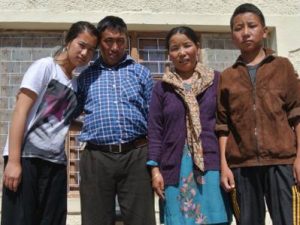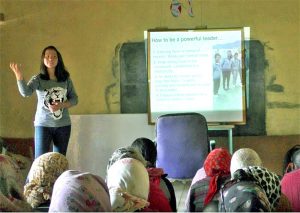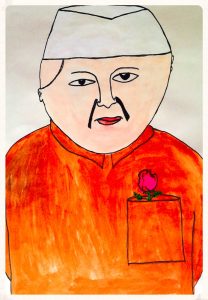Graduation at Rockland Country Day School, in Congers, NY, is an unusual affair – no valedictorian, no  salutatorian. Just those graduates who want to say something doing precisely that. It’s always moving. But this year it was especially moving when WISE graduate, Chuskit Tsewang, got up to say her piece. Moving and unusual because Chuskit, herself, is so unusual.
salutatorian. Just those graduates who want to say something doing precisely that. It’s always moving. But this year it was especially moving when WISE graduate, Chuskit Tsewang, got up to say her piece. Moving and unusual because Chuskit, herself, is so unusual.
An Entire Class of WISE Graduates RCDS is used to having WISE graduates speak at graduation – because every senior at the school participates in WISE. It is also used to having international students speak at graduation because there is a thriving population of international students, mostly Chinese and Korean but with a few other countries as well, at the school.
An International Student Different from the Rest But Chuskit was different from most of the international students and that difference became clear as she spoke about her experiences at the school. It wasn’t just that she came from India, which she did. It wasn’t just that she had to struggle, when she arrived, to understand, and succeed in meeting, the demands of a rigorous American curriculum, which she did. It was that her background was so different from both the students coming from the local area around the school and the other international students. A difference that she spoke about, eloquently, and that she incorporated into her WISE project which she started early in her senior year and planned for the entire summer before that. A WISE project that illuminates what it is that Chuskit wants to do, when she completes her college education, for the rest of her life.
became clear as she spoke about her experiences at the school. It wasn’t just that she came from India, which she did. It wasn’t just that she had to struggle, when she arrived, to understand, and succeed in meeting, the demands of a rigorous American curriculum, which she did. It was that her background was so different from both the students coming from the local area around the school and the other international students. A difference that she spoke about, eloquently, and that she incorporated into her WISE project which she started early in her senior year and planned for the entire summer before that. A WISE project that illuminates what it is that Chuskit wants to do, when she completes her college education, for the rest of her life.
Chuskit’s Story Chuskit spoke of her mother’s sacrifice in sending her away from home at the age of eight so that Chuskit could have the education her mother never received:

Chuskit and her family back home
She wanted me to have a different life from hers. She quit school very young and started working as a servant. My grandparents and she thought two rupees a month was worth more than an education. By age eighteen, she regretted the choice, but by then it was too late…When I was eight, she took me to Stok, a village six hours away, because she’d heard of a good school started by a Buddhist monk. She was told he was generous and willing to help needy people. Khen Rinpoche took me into his school, Siddhartha. I am grateful to him for all that he has done to start the school and for accepting so many children like me who could not afford private school. https://www.youtube.com/watch?v=O2NkXu3irnc&feature=youtu.be
Culture Shock After completing the tenth, and final, year of high school at Siddhartha, Chuskit received a scholarship, funded both by backers at the Siddhartha School and by Rockland Country Day School, that enabled her to come to RCDS and complete her high school education, living with a host family in Tappan, NY. The United States turned out to be very different from anything she had envisioned: “Everything is so different here—food, climate, environment, and even the way school is taught. My first six months at school was very difficult; I had no idea, most of the time, just what my teachers were talking about. I found their English so different from what I had been taught in India. But thanks to the help of my teachers and many meetings with them after school, I started to do better.” And she revved up her determination to use her education to help the people she had left back at home.

Speaking to Village Women and Girls in Ladakh
Summer School, Smith and Giving Back Her first year successfully, if sometimes stressfully, completed, Chuskit went on to two summer programs: ANNpower Women Leadership Program, focusing on empowering young women; and Smith College’s Summer Science Program, designed both to encourage girls to pursue science and engineering and to take leadership roles in so doing. She was able to attend both through scholarships and, in the case of the summer school, additional monies she raised herself through crowdfunding. Upon the completion of these activities, she was able to return for a month to Lakakh where she put what she had just learned to work, organizing sessions for girls and women in Ladakhi villages in which she and her co-Siddhartha graduate also studying in the United States, Stanzin Angmo, presented information on women’s health issues, sex education and women’s empowerment…a tall order for two 11th grade girls to organize, fund (again through crowdfunding) and complete. She learned immense amounts through working with the powers-that-be in Ladakh – about conservative misgivings on the part of many about any discussion of contraception and sex education, about dealing, eventually successfully, with bureaucracies to gain access to these villages, about the hunger for knowledge and responsiveness to the messages that the girls were bringing on the part of the village women and girls they reached.

Cha Cha(Uncle in Hindi) Nehru, hero for Children’s Day, selected by Sonam Chuskit, Gd. 4 at Siddhartha
WISE Plans In the Works After that whirlwind of a year, Chuskit was primed for her senior year and her WISE project. She had been thinking for some time about working on a woman’s health initiative, and now that she had gotten her feet thoroughly wet over the summer, she hoped, at first, to build upon what she had done and create some sort of link between girls from Ladakh and girls here in the States. In the fall she was introduced to a girls’ club on New York City’s Lower East Side, the Lower East Side Girls Club (LESGC), and attended a show, sponsored by the Siddhartha School, displaying the results of an on-going intercultural art exchange called the Hero Project between children from schools and clubs around the United States and children from Siddhartha and other schools in Asia. A cross-cultural WISE project began to form in Chuskit’s mind. At first she wanted to keep her emphasis on health and empowerment issues, but the girls club was more interested in learning about Ladakhi culture, art, dress and dance. Realizing that any correspondence between girls from such different areas would lead to the sort of awakening she had had upon her arrival in the States, Chuskit eventually went with a cultural exchange between the girls at Siddhartha and those at the Girls Club.
Prayer Flags and Understanding How to accomplish what she wanted was still a question mark in her mind. To get girls at such a distance from each other to share experiences, to help each group understand what it was like for the other to grow up in such a different place, to build confidence in girls who represented disadvantaged communities in both cases was no easy task. One idea was to have them get to know each other through Skype conversations, but technical difficulties might stand in the way of that happening, internet access in Ladakh being somewhat problematic. Working on handicrafts that they could exchange and that would unite them in a common mission was another idea – which made Chuskit think of the traditional Ladakhi prayer flags, common to her part of India and to other Himalayan areas, from Nepal and Tibet to China. Prayer flags. Prayer flags fly in those mountainous regions with messages on them spread by the winds to all corners, messages generally conveying hopes for peace, compassion, good will. What better way could the girls convey their feelings to each other than by creating prayer flags that they could then exchange with each other?
areas, from Nepal and Tibet to China. Prayer flags. Prayer flags fly in those mountainous regions with messages on them spread by the winds to all corners, messages generally conveying hopes for peace, compassion, good will. What better way could the girls convey their feelings to each other than by creating prayer flags that they could then exchange with each other?

Siddhartha Art Exhibit at LESGC
The girls responded enthusiastically to the notion, and Chuskit’s project was launched. She did some serious research on prayer flags, figured out some messages that might be used (Stay Strong,” “Be Bold,” and “Today we dream, tomorrow we do”) and made a bunch of sample prayer flags to show to both Siddhartha School girls and LESCG girls. She went back and forth from her school in suburban NY to the lower east side and ended up with a collection of prayer flags that got sent back to Siddhartha and was able to persuade teachers at Siddhartha to oversee the making of prayer flags there to send to the girls in New York. She sent videos back and forth between the differing groups of girls to help them get familiar with each other. She went, with her friend Angmo, to model Ladakhi dress and perform Ladakhi dances at Teen Talk Textiles, a big event at the girls’ club, featuring costumes from different cultures, including Mexico, Nepal, Scotland, and Africa as well as Ladakh. She ran into a familiar problem, similar to the opposition that she had faced the previous summer to frank talk about sex education. The members of the audience wanted to know what the songs and dances she and Angmo were performing were all about. The correct answer was LOVE. But with some of the more conservative representatives from Siddhartha in attendance concerned about the girls speaking openly about love and dating, they prevaricated – it was all about FRIENDSHIP, they told the curious onlookers!
A New WISE Idea is Born Chuskit presented her WISE project the week before graduation to an audience that included her host mother, Laura Kozaitis, one of the co-founders of the Siddhartha School, executive director of the Siddhartha School Program and an RCDS parent in her own right as well, and WISE founder Vic Leviatin. Moved and excited by Chuskit’s story, Chuskit’s journey and Chuskit’s project, they began to think about ways in which all the children at Siddhartha could participate in similar learning experiences. What if WISE went to India? And at the moment we are in the midst of discussing that very possibility – of taking WISE, adapted to meet the very different educational environment to be found in Ladakh, to Siddhartha, and of creating a WISE curriculum that would work there. From small seeds….
And Now? Chuskit has a busy future ahead of her. She is returning to India for the summer and working with the children at Siddhartha as well as continuing with her outreach efforts to girls and women in neighboring towns and villages. As a WISE graduate she will be helping lay the foundation for a WISE program that could function at Siddhartha and, perhaps, even at other schools in Ladakh. She is preparing for her freshman year at Smith which starts in late August. She leaves quite a legacy behind her at RCDS and in WISE as someone who has already, at a young age, given back to the people whom she left behind her in Ladakh but whom she never left behind in her heart, who has forged meaningful connections between young people from very different places and who has given impetus to an expansion of WISE into an entirely new and international direction.
the foundation for a WISE program that could function at Siddhartha and, perhaps, even at other schools in Ladakh. She is preparing for her freshman year at Smith which starts in late August. She leaves quite a legacy behind her at RCDS and in WISE as someone who has already, at a young age, given back to the people whom she left behind her in Ladakh but whom she never left behind in her heart, who has forged meaningful connections between young people from very different places and who has given impetus to an expansion of WISE into an entirely new and international direction.

 Saving...
Saving...